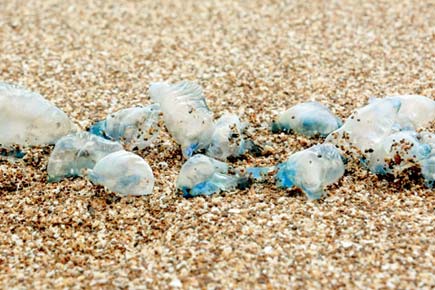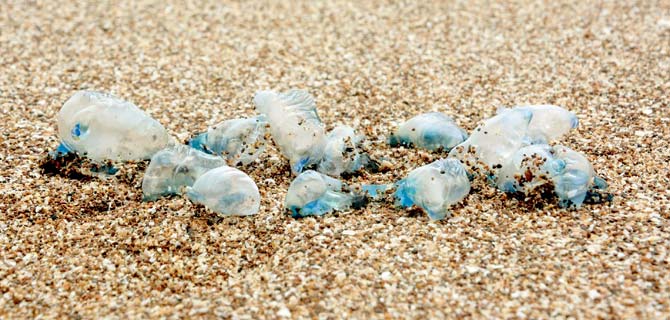Locals have spotted 15-20 blue jellyfish wash ashore at Juhu Beach and experts have advised visitors to be cautious as they are venomous and sting can be painful


The blue jellyfish that has washed ashore
If you had plans of traipsing around on the Juhu Beach, as unusual as that may be, think again because over the last two days, locals have spotted the venomous blue bottle jellyfish – Man O'War – washed ashore. Earlier this month, they were also sighted at the Girgaum Chowpatty and are notorious for their sting, which cause severe itching and burning and swelling.

On Thursday, villagers at Rajodi Beach near Vasai found the body of a whale washed ashore. Experts say it could be a dwarf or pygmy sperm whale
Experts working in marine conservation suggest that visitors need to exercise precautions to avoid being stung by the jellyfish. Anand Pendharkar from NGO SPROUTS, said, "People who visit the beach need to be careful to not accidentally step on or touch the jellyfish or blue buttons (Porpita) swarming along our beaches. They can cause severe irritation, inflammation and rashes. In case of contact, wash the affected area with warm or fresh water and rush to a doctor. Also, one shouldn't attempt to life any marine creatures that they don't recognise as they can possess strong toxins."
The locals have seen close to 15-20 blue bottles in the last two days.
Wildlife lover, Bhushan Bhoir, who is studying Marine Biology and is also the Assistant Zoology professor at SDSM College, Palghar said, "It is also called Portuguese Man O'War because of its appearance like the shape of a Portuguese warrior's hat. If stung, a person suffers in pain for more than 1-3 hours and if the venom reaches the lymph node, they can cause severe problems like swelling in throat, cardiac distress and breathing problems."
What is blue bottle jellyfish?
The blue bottle jellyfish is an Atlantic Portuguese marine creature that has a bubble-like body and 18 to 20-cm long tentacles. As part of their self-defence, they usually fling their tentacles at whatever approaches them.
 Subscribe today by clicking the link and stay updated with the latest news!" Click here!
Subscribe today by clicking the link and stay updated with the latest news!" Click here!









